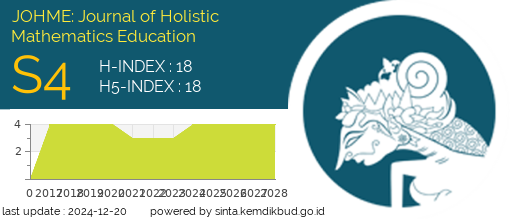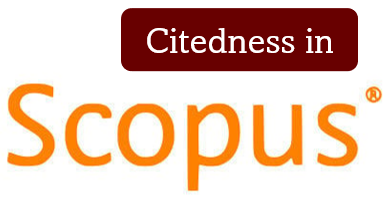THE ING NGARSA SUNG TULADHA COOPERATIVE LEARNING MODEL AND STUDENTS' PROBLEM SOLVING ABILITIES
DOI:
https://doi.org/10.19166/johme.v3i2.2005Keywords:
cooperative learning, Ing Ngarsa Sung Tuladha, problem solvingAbstract
This paper describes one way that teachers as educators can face the challenges of the industrial revolution 4.0, namely by instilling and preparing creative and character-based leaders. Education as character building can be implemented using Ki Hajar Dewantara's leadership concepts, namely Ing Ngarsa Sung Tuladha, Ing Madya Mangun Karsa, and Tut Wuri Handayani. The concept of leadership was first adopted as a cooperative learning model which emphasized exemplariness in group learning. The group leader is called tuladha and is the facilitator of the group. Tuladha utilizes the Internet of Things. Before the teaching and learning process in class, information, concepts or ideas, and examples are posted by the teacher to the tuladha. This study is an experimental study with the sample used meeting the prerequisites of the statistical test used. The results showed that students' mathematical problem solving abilities increased significantly using the Ing Ngarsa Sung Tuladha cooperative learning model over the usual method. The category of improving students' mathematical problem solving abilities that obtain the Ing Ngarsa Sung Tuladha cooperative learning model is in the high category.
References
Alia, T., & Irwansyah. (2018). Pendampingan orang tua pada anak usia dini dalam penggunaan teknologi digital [Parent mentoring of young children in the use of digital technology]. Polyglot: Jurnal Ilmiah, 14(1), 65-78. https://doi.org/10.19166/pji.v14i1.639
Anggraeni, R., & Herdiman, I. (2018). Kemampuan pemecahan masalah matematik siswa SMP pada materi lingkaran berbentuk soal kontekstual ditinjau dari gender. Jurnal Numeracy, 5(1), 19-27. Retrieved from https://docplayer.info/84798213-Kemampuan-pemecahan-masalah-matematik-siswa-smp-pada-materi-lingkaran-berbentuk-soal-kontekstual-ditinjau-dari-gender.html
Appulembang, O. D. (2017). Profil pemecahan masalah aljabar berpandu pada taksonomi SOLO ditinjau dari gaya kognitif konseptual tempo siswa SMA Negeri 1 Makale Tana Toraja [A profile of guided algebra problem solving using the SOLO taxonomy and the cognitive conceptual tempo style of students at the SMA Negeri 1 school in Makale, Tana Toraja]. Polyglot: Jurnal Ilmiah, 13(2), 47-64. https://doi.org/10.19166/pji.v13i2.336
Aronson, E. (1978). The jigsaw classroom. Beverly Hills, CA: Sage Publications.
Dewantara, K. H. (1977). First part of education. Yogyakarta, Indonesia: Luhur Council of Taman Siswa Association.
Hutagaol, K., Saija, L. M., & Simanjuntak, D. C. C. (2018). Model pembelajaran kooperatif ing ngarsa sung tuladha. Jurnal Padegogik Matematika, 1(2), 89-105. https://doi.org/10.35974/jpd.v1i2.659
Nugrahaningsih, T. K. (2011). Implementasi ajaran Ki Hajar Dewantara dalam pembelajaran matematika untuk membangun karakter siswa. Prosiding Seminar Nasional Matematika dan Pendidikan Matematika. Retrieved from https://eprints.uny.ac.id/7371/1/p-16.pdf
Polya, G. (1957). How to solve it (2nd ed.). Garden City, NY: Doubleday.
Ristekdikti. (2018). Development of science and technology and higher education in the era of the industrial revolution. Retrieved from https://www.ristekbrin.go.id/rakernas-2018/
Simanjuntak, M. F., & Sudibjo, N. (2019). Meningkatkan keterampilan berpikir kritis dan kemampuan memecahkan masalah siswa melalui pembelajaran berbasis masalah [Improving students’ critical thinking skills and problem solving abilities through problem-based learning]. JOHME: Journal of Holistic Mathematics Education, 2(2), 108-118. http://dx.doi.org/10.19166/johme.v2i2.1331Soedjadi. (2000). Kiat pendidikan matematika di Indonesia. Bandung, Indonesia: Dirjen Dikti Depdiknas.
Sudrajat, A. (2010). Definisi pendidikan menurut UU no. 20 tahun 2003. Retrieved from https://akhmadsudrajat.wordpress.com/2010/12/04/definisi-pendidikan-definisi-pendidikan-menurut-uu-no-20-tahun-2003-tentang-sisdiknas/
Suherman, E. (2003). Strategi pembelajaran matematika kontemporer. Bandung, Indonesia: Penerbit JICA.
Susetya, W. (2007). Kepemimpinan Jawa. Yogyakarta, Indonesia: Narasi.
Suwarto. (2018). Proses belajar mengajar dalam perspektif sistem among. Prosiding Seminar Nasional KALUNI. Retrieved from http://rumahpublikasi.com/index.php/prokaluni/article/view/231/135
Syaikhudin, A. (2012). Konsep pemikiran pendidikan menurut Paulo Freire dan Ki Hajar Dewantoro. Cendekia: Jurnal Kependidikan dan Kemasyarakatan, 10(1), 79-92. https://doi.org/10.21154/cendekia.v10i1.403
Thamsir, T., Silalahi, D. W., & Soesanto, R. H. (2019). Upaya meningkatkan kemampuan pemecahan masalah soal non-rutin pada materi persamaan dan pertidaksamaan linear satu variabel dengan penerapan metode peer tutoring [Efforts in improving mathematical problem-solving skills of non-routine problems of one-variable linear equations and inequalities by implementing the peer tutoring method]. JOHME: Journal of Holistic Mathematics Education, 3(1), 96-107. https://doi.org/10.19166/johme.v3i1.927
Tosepu, Y. (2019). Metode pendidikan baru dalam beradaptasi revolusi industri 4.0. Retrieved from https://www.kompasiana.com/lsp3i/5c6dae62aeebe123db02d452/metode-pendidikan-baru-dalam-berdaptasi-dengan-revolusi-industri-4-0-kajian-the-future-of-global-higher-education?page=allDownloads
Additional Files
Published
How to Cite
Issue
Section
License
Authors who publish with this journal agree to the following terms:
1) Authors retain copyright and grant the journal right of first publication with the work simultaneously licensed under a Creative Commons Attribution License (CC-BY-SA 4.0) that allows others to share the work with an acknowledgement of the work's authorship and initial publication in this journal.
2) Authors are able to enter into separate, additional contractual arrangements for the non-exclusive distribution of the journal's published version of the work (e.g., post it to an institutional repository or publish it in a book), with an acknowledgement of its initial publication in this journal.
3) Authors are permitted and encouraged to post their work online (e.g., in institutional repositories or on their website). The final published PDF should be used and bibliographic details that credit the publication in this journal should be included.”










